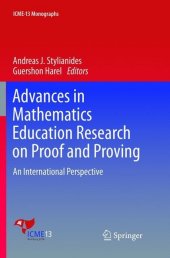 Neuerscheinungen 2019Stand: 2020-02-01 |
Schnellsuche
ISBN/Stichwort/Autor
|
Herderstraße 10
10625 Berlin
Tel.: 030 315 714 16
Fax 030 315 714 14
info@buchspektrum.de |

Guershon Harel, Andreas J. Stylianides
(Beteiligte)
Advances in Mathematics Education Research on Proof and Proving
An International Perspective
Herausgegeben von Stylianides, Andreas J.; Harel, Guershon
Softcover reprint of the original 1st ed. 2018. 2019. xi, 301 S. 48 SW-Abb. 235 mm
Verlag/Jahr: SPRINGER, BERLIN; SPRINGER INTERNATIONAL PUBLISHING 2019
ISBN: 3-319-89025-5 (3319890255)
Neue ISBN: 978-3-319-89025-8 (9783319890258)
Preis und Lieferzeit: Bitte klicken
This book explores new trends and developments in mathematics education research related to proof and proving, the implications of these trends and developments for theory and practice, and directions for future research. With contributions from researchers working in twelve different countries, the book brings also an international perspective to the discussion and debate of the state of the art in this important area.
The book is organized around the following four themes, which reflect the breadth of issues addressed in the book:
- Theme 1: Epistemological issues related to proof and proving;
- Theme 2: Classroom-based issues related to proof and proving;
- Theme 3: Cognitive and curricular issues related to proof and proving; and
- Theme 4: Issues related to the use of examples in proof and proving.
Under each theme there are four main chapters and a concluding chapter offering a commentary on the theme overall.
Preface
Andreas J. Stylianides ; Guershon Harel
as899@cam.ac.uk
THEME 1: EPISTEMOLOGICAL ISSUES RELATED TO PROOF AND PROVING
Chapter 1. Reflections on proof as explanation
Gila Hanna - gila.hanna@utoronto.ca
Chapter 2. Working on proofs as contributing to conceptualization - The case of IR completeness
Viviane Durand-Guerrier ; Denis Tanguay
viviane.durand-guerrier@umontpellier.fr
Chapter 3. Types of epistemological justifications, with particular reference to complex numbers
Guershon Harel
harel@math.ucsd.edu
Chapter 4. Mathematical argumentation in elementary teacher education: The key role of the cultural analysis of the content
Paolo Boero ; Giuseppina Fenaroli; Elda Guala
boero@dima.unige.it
Chapter 5. Toward an evolving theory of mathematical practice informing pedagogy: What standards for this research paradigm should we adopt?
Keith Weber ; Paul Dawkins
keith.weber@gse.rutgers.edu
THEME 2: CLASSROOM-BASED ISSUES RELATED TO PROOF AND PROVING
Chapter 6. Constructing and validating the solution to a mathematical problem: The teacherīs prompt
Maria Alessandra Mariotti ; Manuel Goizueta
mariotti21@unisi.it
Chapter 7. Addressing key and persistent problems of studentsī learning: The case of proof
Andreas J. Stylianides ; Gabriel J. Stylianides
as899@cam.ac.uk
Chapter 8. How can a teacher support students in constructing a proof?
Bettina Pedemonte
bettina.pedemonte@sjsu.edu
Chapter 9. Proof validation and modification by example generation: A classroom-based intervention in secondary school geometry
Kotaro Komatsu ; Tomoyuki Ishikawa; Akito Narazaki
kkomatsu@shinshu-u.ac.jp
Chapter 10. Classroom-based issues related to proofs and proving
Ruhama Even
ruhama.even@weizmann.ac.il
THEME 3: COGNITIVE AND CURRICULAR ISSUES RELATED TO PROOF AND PROVING
Chapter 11. Mathematical argumentation in pupilsī written dialogues
Gjert-Anders Askevold; Silke Lekaus
slek@hib.no
Chapter 12. The need for "linearity" of deductive logic: An examination of expert and novice proving processes
Shiv Smith Karunakaran
karunak3@msu.edu
Chapter 13. Reasoning-and-proving in algebra in school mathematics textbooks in Hong Kong
Kwong-Cheong Wong ; Rosamund Sutherland
wongkwongcheong@gmail.com
Chapter 14. Irish teachersī perceptions of reasoning-and-proving amidst a national educational reform
Jon D. Davis
jon.davis@wmich.edu
Chapter 15. About the teaching and learning of proof and proving: Cognitive issues, curricular issues and beyond
Lianghuo Fan ; Keith Jones
l.fan@southampton.ac.uk
THEME 4: ISSUES RELATED TO THE USE OF EXAMPLES IN PROOF AND PROVING
Chapter 16. How do pre-service teachers rate the conviction, verification and explanatory power of different kinds of proofs?
Leander Kempen
kempen@khdm.de
Chapter 17. When is a generic argument a proof?
David Reid ; Estela Vallejo Vargas
dreid@math.uni-bremen.de
Chapter 18. Systematic exploration of examples as proof: Analysis with four theoretical frameworks
Orly Buchbinder
orly.buchbinder@unh.edu
Chapter 19. Using examples of unsuccessful arguments to facilitate studentsī reflection on their processes of proving
Yosuke Tsujiyama ; Koki Yui
tsujiyama@chiba-u.jp
Chapter 20. Genericity, conviction, and conventions: Examples that prove and examples that donīt prove
Orit Zaslavsky
orit.zaslavsky@nyu.edu


